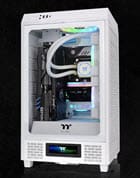Guys, could this possibly be the most worthy mini PC for home server? I can't believe the specs. Check these out:
- i9-12900H or i9-13900H
- DDR5
- PCIe 4.0 x16 slot
- 2 10 gig SFP ports
- 2 2.5 GbE ports
- a PCI-e 4 slot
- U.2 NVMe SSD support
Guys, could this possibly be the most worthy mini PC for home server? I can't believe the specs. Check these out:
wow that is bonkers. i'm super tempted to grab one even though i have no use for it right now....
@malcolm-r I didn't even catch the out-of-band management, even better! Wondering about the power and efficiency cores with ESXi and Promox. I know these can cause issues. This thing with a Xeon or a Ryzen proc would be perfect in many ways.
@jnew1213 have you ever played around with P+E cores with ESXi? Curious on your findings. I recently reviewed a GMKTek M3 with an i5 with P+E and had some issues with ESXi and Proxmox. There are some boot strings you need to add to prevent purple screens.
I haven't yet run ESXi on any machine with P+E cores. ESXi's scheduler, being unaware of the different cores, is going to treat them the same when assigning them to a workload. I don't see how this is a good thing.
I realize the "thing to do" is to tell ESXi to ignore differences in cores at boot time but, I think, disabling efficiency cores in the machine's BIOS and letting ESXi schedule using only performance cores may be a better idea, depending on workload and whether any consistency is desired across application instances.
Example: we compute Pi to 100,000 digits in a VM running on an Alder Lake Core i9 with 24 cores (P+E). The computation takes, say, 7 minutes. We do it a second time and it takes 12 minutes, because this time, ESXi has given the VM more efficiency cores during more scheduling instances. Just by chance. There must be some workloads that you don't want to schedule against efficiency cores. Ever.
As an aside, the Alder Lake N100 in the little GMKtec mini that I've been playing with has only efficiency cores. So that eliminates issues with different core types. ESXi runs just fine on it without any boot string requirements. Only the TPM is not usable (no VIB for it, it seems).
As another aside (can you have too many asides?), my desktop PC happens to be the above described Alder Lake Core i9 with 24 cores. It's an Intel NUC Extreme, running Windows 11. I don't think it'll ever be running ESXi, even when eventually retired from desktop use.
The MS-01 looks nice. But for its price, I can pick up two Dell PowerEdge R730 systems, which we know run ESXi really, really well. Just sayin'.
@jnew1213 fair point regarding the R730s. but for folks where power/noise is a concern i think these are a great upgrade path.
Currently viewing this topic 1 guest.

As an Amazon Associate, I earn from qualifying purchases.

As an Amazon Associate, I earn from qualifying purchases.